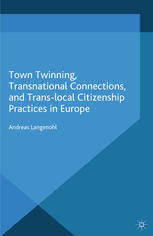Table Of ContentTown Twinning,
Transnational Connections,
and Trans-local Citizenship
Practices in Europe
Andreas Langenohl
Town Twinning, Transnational Connections, and
Trans-local Citizenship Practices in Europe
EuropeinaGlobalContext
SeriesEditor:AnneSophieKrossa,UniversitätGiessen
Titlesintheseriesinclude:
NicoleFalkenhayner
MAKINGTHEBRITISHMUSLIM
AndreasLangenohl
TOWNTWINNING,TRANSNATIONALCONNECTIONS,ANDTRANS-LOCAL
CITIZENSHIPPRACTICESINEUROPE
RolandRobertson(editor)
EUROPEANGLOCALIZATIONINGLOBALCONTEXT
RolandRobertsonandSophieKrossa(editors)
EUROPEANCOSMOPOLITANISMINQUESTION
SophieKrossa
EUROPEINAGLOBALCONTEXT
Forthcomingtitles:
ChrisGrocottandJoGrady
CAPITALISTIDEOLOGIESINEUROPEANDBEYOND
EuropeinaGlobalContext
SeriesStandingOrder:HBK:978–1–137–00313–3
PBK:978–1–137–00314–0
(outsideNorthAmericaonly)
You can receive future titles in this series as they are published by placing a
standing order. Please contact your bookseller or, in case of difficulty, write to
usattheaddressbelowwithyournameandaddress,thetitleoftheseriesand
oneoftheISBNsquotedabove.
Customer Services Department, Macmillan Distribution Ltd, Houndmills,
Basingstoke,HampshireRG216XS,England
Town Twinning,
Transnational
Connections, and
Trans-local Citizenship
Practices in Europe
Andreas Langenohl
ProfessorofSociology,JustusLiebigUniversityGiessen,Germany
©AndreasLangenohl2015
Softcover reprint of the hardcover 1st edition 2015 978-1-137-02122-9
Allrightsreserved.Noreproduction,copyortransmissionofthis
publicationmaybemadewithoutwrittenpermission.
Noportionofthispublicationmaybereproduced,copiedortransmitted
savewithwrittenpermissionorinaccordancewiththeprovisionsofthe
Copyright,DesignsandPatentsAct1988,orunderthetermsofanylicence
permittinglimitedcopyingissuedbytheCopyrightLicensingAgency,
SaffronHouse,6–10KirbyStreet,LondonEC1N8TS.
Anypersonwhodoesanyunauthorizedactinrelationtothispublication
maybeliabletocriminalprosecutionandcivilclaimsfordamages.
Theauthorhasassertedhisrighttobeidentifiedastheauthorofthiswork
inaccordancewiththeCopyright,DesignsandPatentsAct1988.
Firstpublished2015by
PALGRAVEMACMILLAN
PalgraveMacmillanintheUKisanimprintofMacmillanPublishersLimited,
registeredinEngland,companynumber785998,ofHoundmills,Basingstoke,
HampshireRG216XS.
PalgraveMacmillanintheUSisadivisionofStMartin’sPressLLC,
175FifthAvenue,NewYork,NY10010.
PalgraveMacmillanistheglobalacademicimprintoftheabovecompanies
andhascompaniesandrepresentativesthroughouttheworld.
Palgrave®andMacmillan®areregisteredtrademarksintheUnitedStates,
theUnitedKingdom,Europeandothercountries.
ISBN 978-1-349-43765-8 ISBN 978-1-137-02123-6 (eBook)
DOI 10.1057/9781137021236
Thisbookisprintedonpapersuitableforrecyclingandmadefromfully
managedandsustainedforestsources.Logging,pulpingandmanufacturing
processesareexpectedtoconformtotheenvironmentalregulationsofthe
countryoforigin.
AcataloguerecordforthisbookisavailablefromtheBritishLibrary.
LibraryofCongressCataloging-in-PublicationData
Langenohl,Andreas,1970–
Towntwinning,transnationalconnectionsandtrans-localcitizenship
practicesinEurope/AndreasLangenohl.
pages cm.—(Europeinaglobalcontext)
Includesbibliographicalreferences.
1. Citiesandtowns—Europe. 2. Sistercities. 3. Urbanpolicy—
Europe. 4. Communitydevelopment—Europe. 5. Transnationalism—
Europe. 6. Nationalism—Europe. 7. Regionalplanning—Europe.
I. Title.
HT131.L362015
307.1(cid:2)216094—dc23 2014036786
Contents
ListofFiguresandTables vi
Acknowledgments vii
1 Introduction:LocalTransnationalismina‘Europe
forCitizens’ 1
2 EuropeanVisions:OnthePoliticalHistoriographyofTown
Twinning 14
3 Small-townTransnationals:The(Trans-)localityofTown
Twinning 35
4 MakingTownsMeet:TheSocialLogicsof(Trans-)local
Encounters 62
5 Trans-localFriendships:TheMicrostructuresofTwinning
Sociability 108
6 Organizing(Civic)Culture:TheMakingofEuropeans 134
7 (Trans-)localEconomies:ImaginaryUnderstandingsof
Europe 171
8 AestheticandCulturalIdiomsofDifferenceinTown
Twinning 199
9 Conclusion:TownTwinningandtheEthicsofExchange 220
Notes 229
Bibliography 236
Index 247
v
Figures and Tables
Figures
3.1 Breitentaltwinningeventcalendarfor2013(author’s
translation) 36
8.1 ExcursionprogramfortheparticipantsfromHochburg
(author’stranslation) 207
Tables
4.1 Practicefieldsandlogicsof(trans-)localencounterin
towntwinning 63
4.2 Breitental’ssociallogicsof(trans-)locality 104
4.3 Lahnfels’ssociallogicsof(trans-)locality 105
4.4 Tiefwalden’ssociallogicsof(trans-)locality 106
vi
Acknowledgments
Iwouldliketoexpressmygratitudetothefollowing.
First of all, I would like to cordially thank the many interlocutors
in the towns I have visited, who gave the project their time, support,
sympathy, and trust, regardless of whether they contributed to town
twinning through the political administration, twinning committees,
voluntaryassociations,orastransnationalhostsandguests.
Theprojectwasgreatlyenhancedbythesupportofmyresearchassis-
tants: Friedrich Hirler, who helped compile the literature review on
whichthepresentbookisbased,andManuelErdmeier,whoprogressed
from being a project assistant to an independent researcher assigned
with the multiple tasks of conducting twinning-related ethnographies,
interviews,encodingthem,andforgingcontactswithsomeofthetowns
inthesample.
The project was discussed in many different research contexts and
greatlybenefitedasaresult.FranziskaOchsandSarahHaase,workingon
issuesrelatedtoassociationaltransnationalism,havecontributedgreatly
to the project through our joint discussions. Kristian Naglo has been a
discussion partner with respect to the concept of the social imaginary
that informs the present book (cf. Chapter 7). The comments of Anne
Sophie Krossa, the series editor, on the original manuscript have been
invaluableinhelpingtorephrasesomeofthearguments;andIwantto
thankAnneSophieespeciallyforinvitingmetocontributetotheseries
Europe in a Global Context, which encouraged me to write this book in
thefirstplace.Finally,IwouldliketothankTonyWaineforproofreading
themanuscript.
Thanks to a grant from the Center of Excellence 16 ‘Cultural
Foundations of Integration’ at Konstanz University I was able to
dedicate the summer term 2013 to working on this book at the
KulturwissenschaftlichesKollegina(not-so)small-townsettingrivaling
mostplacesIhaveeverbeento,nottomentionthelocalassemblageof
intellectualgeniusesatthe‘KuKo.’IwouldliketothankalltheKuKo’s
fellows for stimulating discussions, in particular Astrid Bochow, Eva
Johach, Rijk van Dijk, and Thomas Kirsch. Konstanz has indeed been
decisiveforcertaindecisionstakeninthisbook.BernhardKleebergand
Özkan Ezli involved me in a series of fruitful conversations about the
notions of culturalization and localization that figure prominently as
vii
viii Acknowledgments
conceptsinthebook(cf.chapters3and8).RobertSuterpointedoutto
methattherelationshipbetweenfriendshipandhospitality–or,accord-
ingtotheGermanrendition,Freundschaft andGastfreundschaft –might
beofsomeimportanceforthebookproject,andthisprovedtobeone
of its guiding themes (cf. Chapter 5). Gabriela Signori encouraged me
toaddresstheallegedlywaningimportanceofthesubjectmatterofthe
book–towntwinning–assertivelyandopenly(cf.Chapter9).Albrecht
Koschorkepointedouttomethepotentialfunctionalityofthe‘speech-
less’friendshipsthatseemtobecharacteristicoffirst-generationpostwar
twinners,whomighthavefounditdifficulttoaddressthetopicofthe
recentpastverbally.
So, I do contend that locality and localization matter. This is a book
abouttheconstitutiveroleoflocalizationinbringingabouttrans-local
andtransnationalsociality,communality,andmaybesomethingakinto
solidarity.AndinthisspiritIdedicateittothememoryofHans-Joachim
Danne,whohadtodepartfromthisplacetooearlyandwhoselocalizing
powerissopainfullyabsent.
1
Introduction: Local
Transnationalism in a ‘Europe
for Citizens’
The term ‘town twinning’ refers to a set of practices that have gained
broad currency in Europe, in particular with a view to the process of
European integration. It involves millions of citizens in Europe. For
instance, according to data from the Council of European Regions and
Municipalities, the total number of twinnings in Europe rose from
34,200 to 39,816 between 2006 and 2010.1 It is therefore not surpris-
ing that the European Union has chosen town twinning as a strategic
site on the part of its citizens for fostering their commitment to and
identification with the supranational European polity, as becomes evi-
dentfromreadingthe‘EuropeforCitizens’program(ProgrammeGuide,
2013).
At the same time town twinning is a practice in change. While the
EUhasplacedtowntwinningatthecenterofitsagendaforproducing
greater political–cultural affection and sympathy in European citizens
towardEurope,popularinterestintowntwinningwouldseemtobeon
thedecline,withcheaptravelopportunitiesreplacingthedeepimmer-
sioninotherculturesonceenvisionedbytowntwinning,atrendmany
practitionerscomplainabout.
Eversinceitsinception,followingtheSecondWorldWar,towntwin-
ning has been related to political processes in Europe. However, its
relationstopoliticsproperhavebeenuneasyattimes.Ontheonehand
twinningwassupposedtoreinstallthemunicipalityastheseatofpolit-
ical inclusion and decision-making in Europe, and at the same time
to contribute to achieving a better understanding among the popula-
tions of nation-states in Europe with a view to a truly cosmopolitan
politicalculture.Ontheotherhandtheconsequencesdrawnfromthis
agenda sometimes shifted twinning onto a precarious terrain where its
1

